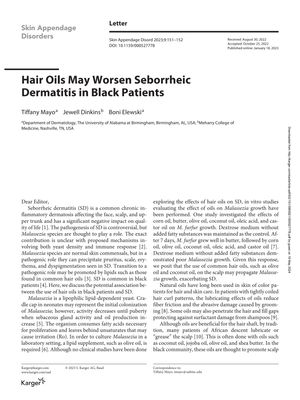Hair Oils May Worsen Seborrheic Dermatitis in Black Patients
January 2023
in “
Skin appendage disorders
”

TLDR Hair oils can worsen seborrheic dermatitis in black patients.
The article discusses the potential exacerbation of seborrheic dermatitis (SD) in black patients due to the use of hair oils. SD is a chronic inflammatory condition influenced by Malassezia yeast, which thrives on lipids found in common hair oils like olive and coconut oil. Although these oils are traditionally used in the black community for hair health and to treat perceived "dry scalp," they may actually worsen SD by promoting Malassezia growth. The article suggests that while oils can benefit the hair shaft, they should be avoided on the scalp to prevent aggravating SD. More research is needed to understand the effects of different hair oils on SD.




